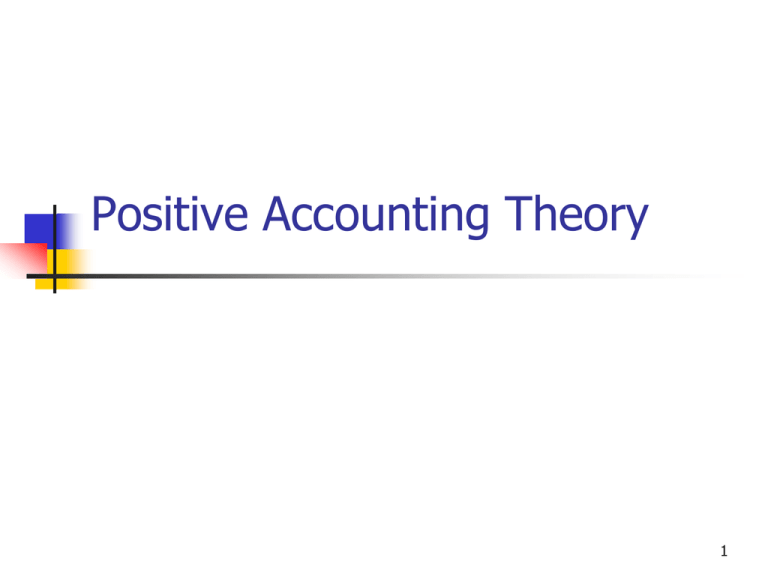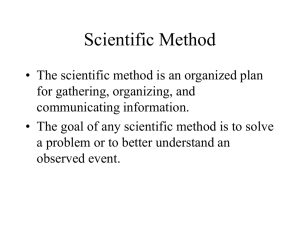File PPT - Teori Akuntansi
advertisement

Positive Accounting Theory 1 PAT Concept Agency Theory Normative Theory Bonus Plan Hypothesis Efficient Market Hypothesis (EMH) Positive Accounting Theory (PAT) Debt Covenant Hypothesis Political Cost Hypothesis Accounting Standards and Practices 2 Positive Accounting Theory Watts and Zimmerman in 1978 and 1986 Apply to Positive Theory of Economic 3 Positive Accounting Theory Teori akuntansi positif mengarahkan pemahaman dan prediksi pilihan kebijakan akuntansi perusahaan, dinyatakan bahwa pilihan kebijakan akuntansi adalah bagian dari kebutuhan perusahaan untuk meminimalisir biaya kontraknya. Kebijakan akuntansi ditentukan oleh struktur organisasi perusahaan menurut kondisi lingkungannya dan pilihan kebijakan akuntansi menjadi bagian dari pengelolaan perusahaan. 4 Dalam praktiknya kebijakan akuntansi akrual diterapkan lewat perlakuan transaksi yang berkaitan dengan laba agar lebih mendekati nilai ekspektasi perusahaan. Hal ini mengingat pihak manajemen memiliki kompetensi untuk mengendalikan kuantifikasi kejadian yang berpengaruh terhadap laba. 5 Agency Theory The agent (like the principal) will be driven by self-interest, and therefore the principals will anticipate that the manager, unless restricted from doing otherwise, will undertake self-serving activities that could be detrimental to economic welfare of the principals. 6 Efficient Market Hypothesis (EMH) The capital markets react in an efficient and unbiased manner to publicly available information. 7 Positive Accounting Theory Assumptions: The accountants (and, in fact, all individuals) are primarily motivated by self-interest (tied to wealth maximisation), and that the particular accounting method selected (where alternative are available). 8 The Three Hypotheses 1. 2. 3. The Bonus Plan Hypothesis The Debt Covenant Hypothesis The Political Cost Hypothesis 9 The Bonus Plan Hypothesis Bonus based on net income To get more bonus, choosing accounting methods that increase current reported earnings 10 The Bonus Plan Hypothesis All other things being equal, managers of firms with bonus plans are more likely to choose accounting procedures that shift reported earnings from future periods to the current period 11 The Bonus Plan Hypothesis Because of the nature of of the accrual process, this will tend to lower future reported earnings and bonuses, other things equal. PV of manager’s utility from future bonus stream will be increased by shifting earnings toward the present 12 The Debt Covenant Hypothesis All other things being equal, the closer a firm is to violation of accounting-based debt covenants, the more likely the firm manager is to select accounting procedures that shift reported earnings from future periods to the current period 13 The Debt Covenant Hypothesis Violation of debt covenant is costly Restriction on dividends Limit additional borrowing Issuance of stock, … Increase current earnings Assets increase To avoid violation 14 The Political Cost Hypothesis All other things equal, the greater the political costs (taxes, regulations) faced by a firm, the more likely the manager is to choose accounting procedures that defer reported earnings from current to future periods 15 The Political Cost Hypothesis Large firm with high profit attracts media, consumers, and politicians attention Large firm trend to reduce profit reports 16 Criticisms Not improving accounting pratices Not value free Not positive thinking for humankind … 17 PAT Concept Agency Theory Normative Theory Bonus Plan Hypothesis Efficient Market Hypothesis (EMH) Positive Accounting Theory (PAT) Debt Covenant Hypothesis Political Cost Hypothesis Accounting Standards and Practices 18








